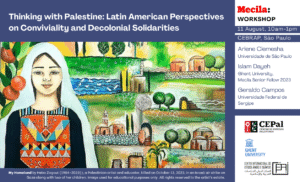CEBRAP, São Paulo
11 August 2025 – 10 am -1 pm
Venue: Auditório Elza Berquó | Centro Brasileiro de Análise e Planejamento (CEBRAP)
Rua Morgado de Mateus, 615 – Vila Mariana
Thinking with Palestine: Latin American Perspectives on Conviviality and Decolonial Solidarities
This interdisciplinary workshop explores Latin American perspectives on Palestine, with particular attention to Brazil. It brings together scholars working at the intersection of Palestine Studies and Latin American thought, with an emphasis on themes such as conviviality, solidarity, settler colonialism, diaspora, extractivism, and decolonisation. The workshop highlights how intellectuals, artists, and activists in Latin America have thought with Palestine—tracing histories of entangled solidarity and exploring how these shape contemporary debates around indigenous resistance, Afro-descendant movements, and environmental struggles. Palestine emerges not only as a site of political urgency, but also as a critical lens through which to reflect on shared conditions of marginalisation, displacement, and epistemic violence. Contributions will examine the Palestinian presence in Latin America, transregional networks of activism, and the role of archives in preserving histories of struggle. The workshop aims to situate Palestine Studies within Latin American debates on decolonisation and knowledge production. Conceived as a collaborative and reflective space, the workshop fosters dialogue across disciplines and geographies. It seeks to amplify relational forms of scholarship and solidarity, and to imagine new vocabularies for thinking Palestine from and with Latin America.
A collaboration between Mecila: Maria Sibylla Merian Centre Conviviality-Inequality in Latin America, Center for Palestine Studies (University of São Paulo), International Center for Arabic and Islamic Studies (Federal University of Sergipe), and Ghent University.

Introduction: Sérgio Costa (Freie Universität Berlin, Director of Mecila 2025) and Tomaz Amorim (Academic Coordinator, Mecila)
— Arlene Clemesha (Director of Centre for Palestine Studies, USP): The Significance of Palestine Studies in Brazil
— Islam Dayeh (Ghent University, Mecila Fellow 2023): The Nakba as Disruption of Conviviality
— Geraldo Campos (Director of the International Centre for Arabic and Islamic Studies, Federal University of Sergipe): Palestine and Global South Solidarity
Discussion with Mecila Fellows and Participants